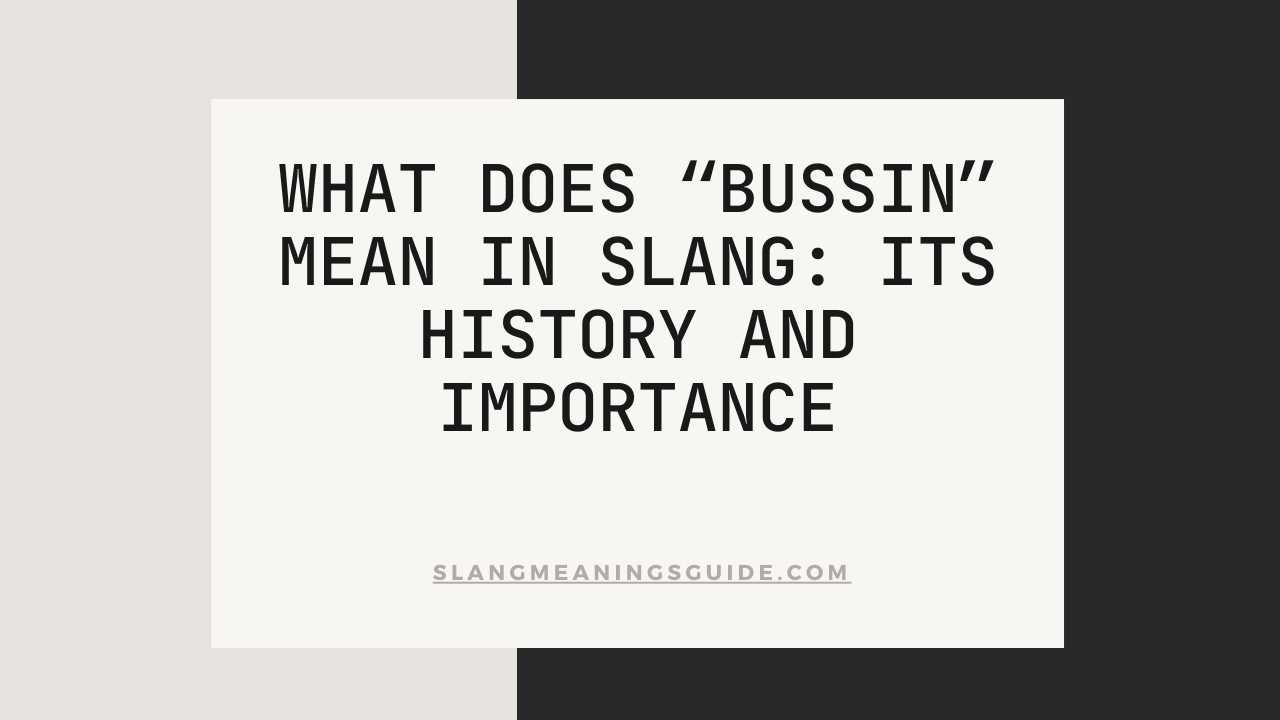| Please Wait Loading ..... |
 |

Language is alive, transforming and evolving in every generation, and specifically slang reflects creativity and humour. Today’s social media trends spread at the speed of light. Like these trends, slang rises and falls more than ever before.
Many different short-term slang capture the attention of today's generation and all of these words that are now trending in our daily conversation like “bussin”. At first glance, those who are not familiar with such terms think that it reflects some moment or bus. Bussin carries an entirely different meaning.
It is a powerful compliment that is used to describe a thing that is exceptionally impressive, delicious, and excellent. This word is used to express approval for something good.
This article will discuss in detail the meaning of the word “Bussin”, its historical roots, evolution, and eventually its overuse.
In slang, “bussin” means something amazing or enjoyable. It is the most commonly used slang in the context of food. Like someone takes a bite of a dish and says that “This food is bussin”. This term holds an extra layer of approval and excitement for something. Simply, it is used to say that something is good and tasty. We also use such terms in our daily conversations. We use it to show our positive emotions for things like food, clothes, music, and events.
The repetition of this word adds an extra excitement for something. Like someone saying that that pizza is “bussin”. It means the food is on another level.
Like many other popular slang terms, it also originated in AAVE. It means African-American vernacular English. It is a linguistic tradition that originated in the black communities of the US. AAVE is a main source of evolution in language and the slang is recognised globally through music and entertainment by the black community of the US. The earliest root of this slang is from the 20th to the 21st century. This originates from the base word “buss” or “bust”.
Over time this evolved to the word “bussin” to show excitement about something. Even before TikTok, this was used in rap culture and hip-hop. This is occasionally used in interviews and music. The main turning point for the rise of slang was the pandemic from 2019 to 2021 when social media became quite popular among the youth. Due to the rise of TikTok, short-term slang gained popularity on multiple social media platforms and some of these lost their cultural roots.
This word may seem like a simple compliment, but it is a long journey from the community of black people in the US to the mainstream of social media. It has a deep cultural dynamic. Such terms often originated from the marginalized communities and then these terms are adopted by mainstream comedy entertainment and music and then eventually on social media platforms.
For black people using such terms is like a person is connected to their community and identity. It holds a humour and creativity that the standard language often lacks. Those who do not know the history of this language, might not even realize that this word comes from AAVE and they just simply use it as a trend. But knowing the history and origin of these connects you to the roots.
Today, this term is widely used among the younger generation. It is mostly used in an online context, like the captions of Instagram and TikTok, and especially in the reaction videos. This word is also used in our daily conversations. In colleges, in groups, and in social circles, Gen Z uses it to show their feelings. Like they often say, “The Coffee of Starbucks is Bussin”.
Internationally, this term is used as internet humor. Memes intentionally use this term again and again for comedic effect, showing how slang has evolved from genuine expression to comedy.
Like many other viral slang terms, this slang is also overused to follow trends and loses its original meaning. But in the case of this slang, it faces the downside of its overuse. Because this word is used to show genuine expression and the constant repetition of this word on social media diluted its effect. The critics examined that due to the overuse of this slang, it started to lose its original meaning.
But still, these slang terms are continually used in different situations, but not as much as before. These are used in both serious and playful situations.
This word “bussin” might be a short slang but it holds a deep meaning and history. The rise of this slang from its roots in AAVE to the mainstream of social media shows the power of language, and how language changes and evolves.
Understanding the slang term “bussin”’ is not just about knowledge, it's about appreciating its culture. It shows that languages are not static, they are alive and change with generations.
Comments